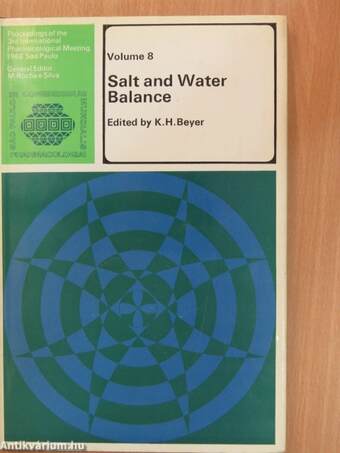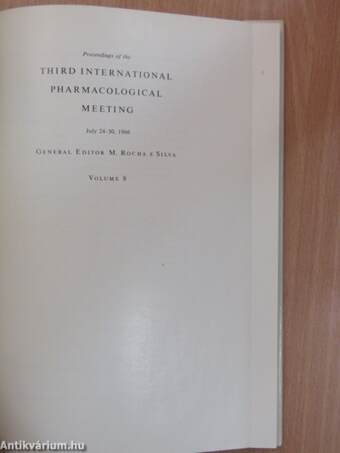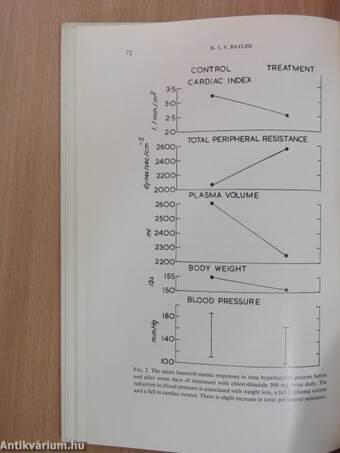1.067.339
kiadvánnyal nyújtjuk Magyarország legnagyobb antikvár könyv-kínálatát

VISSZA
A TETEJÉRE
JAVASLATOKÉszre-
vételek
Salt and Water Balance
| Kiadó: | Pergamon Press |
|---|---|
| Kiadás helye: | Oxford |
| Kiadás éve: | |
| Kötés típusa: | Vászon |
| Oldalszám: | 109 oldal |
| Sorozatcím: | Proceedings of the Third International Pharmacological Meeting |
| Kötetszám: | 8 |
| Nyelv: | Angol |
| Méret: | 23 cm x 16 cm |
| ISBN: | 08-003266-4 |
| Megjegyzés: | Fekete-fehér ábrákkal. További kapcsolódó személyek a kötetben. |
naponta értesítjük a beérkező friss
kiadványokról
naponta értesítjük a beérkező friss
kiadványokról
Előszó
At the outset of this Symposium on Salt and Water Balance, I should
like to introduce a few comments regarding its title and composition that
need to be made and which, I hope, do not... Tovább
Előszó
At the outset of this Symposium on Salt and Water Balance, I should
like to introduce a few comments regarding its title and composition that
need to be made and which, I hope, do not anticipate the primary assign-
ments of the speakers.
To any of you who have reflected on the title of the Symposium and the
subject titles and speakers who make up the program, it should be clear
that the subject of the Symposium is by no means covered by the titles of
the papers. Indeed, to cover the subject of salt and water balance reasonably
adequately we would need to design a series of symposia to run the course
of this Third International Congress of Pharmacology. Moreover, we
would need to invite our friends who are prominent in various phases of
cardiac, vascular and extravascular physiology as well as nephrology at
both a preclinical and a clinical level to lend perspective to this subject.
Thus, for practical reasons, we are confined to a consideration of the
modulation of renal functions by drugs that influences particularly salt
and water excretion by the kidney, and to select an international group
of speakers for this general subject. It is abundantly evident that with the
advent of the thiazides almost 10 years ago the management of salt and
water retention has been substantially improved from the point of view
of both physician and patient alike. This is because the kidney, unlike any
other organ, influences most profoundly the several electrolytes and water
in the over-all maintenance of this fundamental aspect of homeostasis.
It is also because these agents combined convenience of oral administration
with a very practical order of potency, reliability and safety that was not
available previously. The advantages and the shortcomings of these agents
are so well known to the physician that we have elected to emphasize the
preclinical attributes of other diuretics, some newer, some older. This is
not to imply that there is unanimity among pharmacologists regarding the
fundamental aspects of the thiazides, their mode and site of action in the
nephron, their antihypertensive action, whether their effect on glucose Vissza
Tartalom
List of Authors and Participants vii
Beyer, K. H., Jr.
Introductory Remarks 1
Wirz, H.
The Physiological Aspects of Electrolyte Transport 5
Weiner, I. and Far ah, A.
Pharmacology of Mercurial Diuretics 15
Baer, J. E.
Recent Developments in the Pharmacology of Saluretic-diuretic
Agents 37
Schreiner, G. E., Maher, J. F. and O'Connell, J. M. Brian
Clinical Use of Diuretics 53
Bayliss, R. I. S.
The Use of Saluretic Agents in the Management of Hypertension 69
Malnic, G.
Evaluation of the Mode of Action of Some Diuretics by Micro-
puncture Methods 79
Senft, G.
On the Action of Benzothiadiazines and Related Compounds on
Enzymic and Hormonal Regulation of Carbohydrate Metabolism 83
Cahn, J. and Herold, M.
Catecholamine Control of Neurosecretion 93
Taquini, A. C., Yeyati, N. and Bello, A. A.
The Influence of Renal Hemodynamics on Tubular Function 101
Index 107
Témakörök
- Orvostudomány > Élettan
- Idegennyelv > Idegennyelvű könyvek > Angol > Orvostudomány
- Orvostudomány > Belgyógyászat > Általános > Idegennyelvű
- Orvostudomány > Belgyógyászat > Általános > Terápia
- Orvostudomány > Belgyógyászat > Általános > Betegségek > Szív- és érrendszeri
- Orvostudomány > Belgyógyászat > Általános > Betegségek > Urológia
- Orvostudomány > Gyógyszertan > Gyógyszerkészítmények > Egyéb
- Orvostudomány > Gyógyszertan > Gyógyszerkutatás
- Orvostudomány > Gyógyszertan > Gyógyszertan
- Orvostudomány > Gyógyszertan > Idegennyelvű
- Orvostudomány > Orvosi idegennyelvű könyvek > Belgyógyászat
- Orvostudomány > Orvosi idegennyelvű könyvek > Élettan
- Orvostudomány > Orvosi idegennyelvű könyvek > Gyógyszertan












